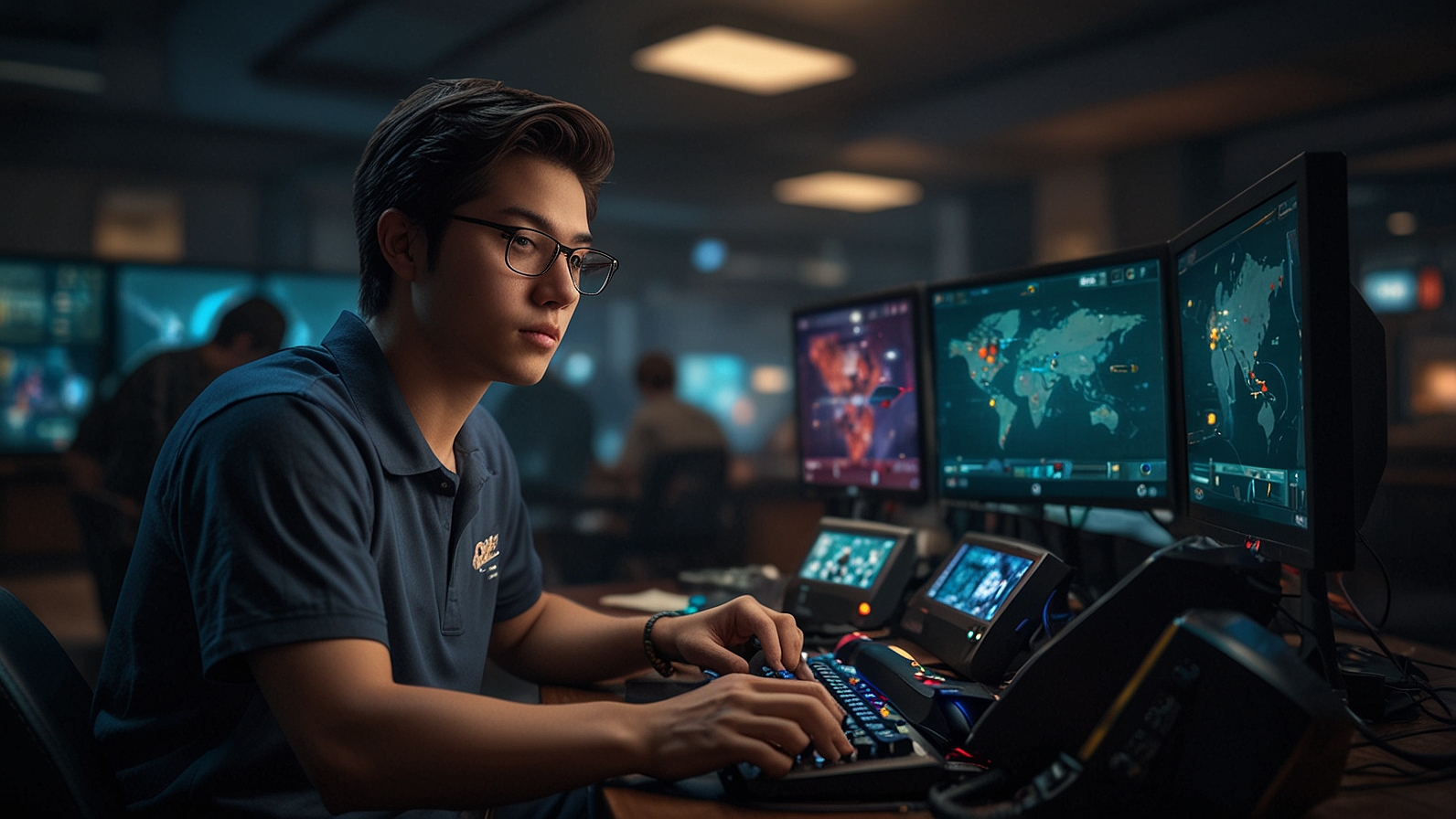What separates a player who simply finishes a game from one who achieves the seemingly impossible? Imagine two gamers facing the same brutal boss fight. One grinds for hours with gritted teeth, fueled by frustration. The other, however, approaches it differently. They study attack patterns, analyze their own failed attempts, and seek out new strategies with a calm, analytical focus. This second player isn’t just playing; they are in a state of flow, treating each obstacle as a puzzle to be solved. This is the essence of the gamer challenger—a dedicated individual who pursues structured challenges not just to win, but to fundamentally evolve their abilities and redefine their own limits. Let’s dive in.
Simply put, a gamer challenger is an athlete of the mind and reflexes. They view gaming not just as a pastime, but as a craft. For this player, the real game begins after the credits roll or the standard ranked matches end. They are driven by a deep-seated desire for self-improvement and the unique satisfaction that comes from overcoming a meticulously designed test of skill.
However, this identity isn’t solely defined by being a professional esports athlete. While many pros embody this spirit, the gamer challenger exists at all levels. They are the:
- Speedrunner attempting to shave milliseconds off a world record.
- The completionist who methodically hunts down every hidden collectible and achievement.
- The creative mode enthusiast in games like Minecraft or Dreams, building architectural wonders just for the challenge of creation.
- The ranked grinder who, after hitting a plateau, spends hours in training mode to perfect a single, game-changing technique.
The Core Motivator is Growth. The primary drive isn’t just loot or a higher number next to their name; it’s the tangible proof of personal progress. A gamer challenger feels a sense of accomplishment when they finally execute a complex combo consistently or develop a new strategy that outsmarts their opponents.
What does it take to adopt this mindset? It’s a blend of attitude and approach that turns play into purposeful practice.
Embrace the “Why” Behind the “L.” For a gamer challenger, every loss is a data point, not a defeat. Instead of blaming lag or unbalanced characters, they ask: “What could I have done differently? Where was my positioning weak? Did I misread my opponent’s strategy?” This shift from external blame to internal analysis is the single most important step in the journey.
Process Over Outcome. Obsessing over your rank can create anxiety and tilt. The gamer challenger focuses on the process. For example, a goal isn’t “I must reach Diamond rank tonight,” but rather, “In my next five matches, I will focus solely on improving my map awareness and callouts.” This makes improvement measurable and lessens the sting of a lost match, as long as the personal goal was met.
The Power of Deliberate Practice. Mindlessly playing hundreds of matches leads to stagnation. Deliberate practice, however, is focused and structured. It means:
- Isolating Skills: Spending 30 minutes in an aim trainer before jumping into a shooter.
- Reviewing VODs: Watching recordings of your own gameplay to spot mistakes you missed in the heat of the moment.
- Seeking Resources: Studying guides, watching tutorials from top players, and understanding game theory.
Thankfully, you don’t have to invent challenges from scratch. A whole ecosystem exists to support the gamer challenger ethos.
In-Game Ranked Ladders and Mastery Systems. This is the most common starting point. Games like League of Legends, Valorant, Apex Legends, and StarCraft II have sophisticated ranked systems that pit you against players of similar skill, providing a clear, if sometimes grueling, path of progression. The key is to engage with these systems intentionally, not autopilot.
The World of Speedrunning. Speedrunning is a pure expression of the gamer challenger spirit. Platforms like Speedrun.com host leaderboards for thousands of games, from modern AAA titles to classic retro games. The community is incredibly supportive, sharing strategies and routes to help everyone improve. It’s a deep dive into game mechanics most players never notice.
Creative and Community-Driven Challenges. Many games have modes that foster creative challenges. For instance:
- Game Jams: Events like the Minecraft Build Challenges on Reddit or community-run modding contests for games like RimWorld.
- Impossible Modes: Self-imposed rulesets, like a “No-Hit” run in a Dark Souls game or a “Nuzlocke” challenge in Pokémon.
Popular Gamer Challenger Platforms & Their Focus
| Platform/Event | Type of Challenge | Best For |
|---|---|---|
| In-Game Ranked | Competitive PvP | Players who thrive on head-to-head competition and climbing a visible ladder. |
| Speedrun.com | Time-Trial & Sequence Breaking | Analytical minds who love mastering game mechanics and optimizing routes. |
| Game Jams/Modding | Creative & Technical Skill | Creative individuals who enjoy building, coding, and designing within a game’s framework. |
| Community Tournaments | Structured Competitive Events | Those seeking a more formal, tournament-style environment without going pro. |
Going from a casual player to a true gamer challenger requires a plan. Here’s how to structure your growth.
Step 1: Establish a Baseline. You can’t measure improvement without a starting point. Record a few of your typical gameplay sessions. Be brutally honest with yourself. What are your consistent weaknesses? Is it your aim, your resource management, your decision-making under pressure?
Step 2: Set SMART Goals. Vague goals yield vague results. Make your objectives SMART: Specific, Measurable, Achievable, Relevant, and Time-bound.
- Vague Goal: “I want to get better at Counter-Strike.”
- SMART Goal: “This week, I will increase my headshot percentage by 5% by doing 15 minutes of Aim Lab practice daily and focusing on crosshair placement in Deathmatch.”
Step 3: Diversify Your Drills. Just like a real athlete, cross-training is key.
- Aim Trainers: Tools like Aim Lab or Kovaak’s are fantastic for building muscle memory.
- VOD Review: This is non-negotiable for serious improvement. Watch your losses, but also watch your wins to see what you did right. Better yet, compare your VOD to a top-tier player in a similar situation.
- Learn the Meta: Understand the current “meta” (most effective tactics available) for your game. This doesn’t mean blindly following it, but understanding why it’s effective.
Busting a Common Myth: “Talent is everything.” This is a dangerous misconception. While some may have a natural aptitude, the world’s best players are almost always the ones who have put in the most structured, deliberate practice. Consistent effort trumps innate talent in the long run.
Consider the story of “Elena,” a Rocket League player who was hard-stuck in the Platinum rank for seasons. She loved the game but felt frustrated. Instead of quitting, she decided to adopt a gamer challenger mindset.
First, she identified her core weakness: aerial consistency. Her SMART goal was to hit 80% of her aerial shots in training packs within two weeks. She dedicated 30 minutes each session solely to custom aerial training packs, ignoring ranked play. She recorded her sessions and noticed she was often boosting too early. After adjusting her technique, her success rate climbed.
She then moved to a new goal: better field awareness. She started focusing on her positioning relative to her teammates, a skill she practiced in casual matches. Within a month, not only had she broken into Diamond, but the game felt different—slower, more readable, and deeply strategic. Elena didn’t just rank up; she transformed her entire understanding of Rocket League.
You don’t need to overhaul your life to start this journey. Here are three simple steps you can take right now.
- Start a “Challenge Log.” Grab a notebook or open a digital document. After each gaming session, write down one thing you did well and one thing you need to improve. This simple act of reflection forces you to engage analytically with your play.
- Dedicate the First 15 Minutes. Before you jump into your main game, spend the first 15 minutes in a focused warm-up. This could be in an aim trainer, a training mode, or against AI. This primes your brain for improvement, not just autopilot.
- Find a Community. Join a Discord server or subreddit dedicated to your game. Look for channels focused on strategy and improvement. Ask for a VOD review, or offer to review someone else’s. Teaching a concept is one of the best ways to master it yourself.
The path of the gamer challenger is a rewarding, lifelong pursuit of mastery. It turns gaming from a simple diversion into a rich, engaging hobby that hones your problem-solving skills, resilience, and strategic thinking. The ranks, the achievements, and the world records are merely milestones on a much larger map. The true victory is in the person you become along the way—more patient, more analytical, and more capable of tackling difficult problems, both virtual and real.
So, what challenge will you conquer next? Share your current gaming goal and your biggest “aha!” improvement moment in the comments below!
You May Also Read: Slope Unblocked: Your Guide to the Ultimate Neon Run
Do I have to be a hardcore player to be a gamer challenger?
Not at all! The mindset is what matters. You can be a gamer challenger by dedicating just a few hours a week, as long as that time is focused on deliberate practice and improvement rather than mindless play.
Isn’t this kind of structured practice boring?
It can be if you don’t frame it correctly. The key is to find the joy in the process of improvement itself. Seeing your skills tangibly grow—watching your aim get sharper or your strategies become smarter—can be incredibly satisfying and addictive in its own right.
What’s the best game to start with for this mindset?
Any game you are passionate about! It’s much easier to commit to improving at a game you genuinely love. Competitive multiplayer games, difficult single-player games (like Sekiro or Celeste), and games with robust creative modes are all excellent starting points.
How do I deal with burnout from constant challenge?
Balance is crucial. Schedule “for-fun” sessions where you play without any pressure to improve. It’s also healthy to take breaks or play different games to keep your mind fresh. The goal is sustainable growth, not rapid burnout.
Is this mindset only useful for gaming?
Absolutely not! The principles of deliberate practice, analyzing failures, setting SMART goals, and focusing on process over outcome are directly applicable to learning instruments, sports, coding, and virtually any other skill-based endeavor in life.
How important is having high-end gear?
Good gear can provide a marginal benefit, but it is not a substitute for skill. Many legendary players have risen to the top with standard equipment. Focus on building your foundational skills first; upgrading your gear can come later as a reward for your progress.
Where can I find people to practice with and learn from?
Discord is the best platform for this. Most popular games have massive, official Discord servers with dedicated channels for finding teammates, sharing strategies, and getting help. Subreddits for specific games are also a fantastic resource.

